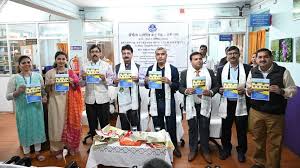On November 16, a significant event took place at the Regional Ayurveda Research Institute (RARI) in Gangtok, Sikkim. Prof. Vd. Rabinarayan Acharya, the Director General of the Central Council for Research in Ayurvedic Sciences (CCRAS), paid a visit to the institute. His visit highlighted the growing importance of Ayurveda in the region and its integration into the broader healthcare system of Northeast India.
Prof. Acharya’s visit to the RARI Gangtok was part of his ongoing efforts to promote Ayurvedic research and enhance its role in the healthcare system of the country. The CCRAS, under his leadership, has been working towards not only preserving traditional knowledge but also bringing in modern scientific methods to validate the efficacy of Ayurvedic treatments. This combination of ancient wisdom and contemporary research has the potential to significantly improve healthcare outcomes in regions like Northeast India, where traditional systems of medicine are highly regarded.
During his visit, Prof. Acharya stressed the importance of Ayurveda as a valuable part of India’s healthcare system. He highlighted how traditional medicines, such as those based on Ayurvedic principles, have been used for centuries to treat a wide range of ailments. However, he acknowledged the need for continuous research and scientific validation to ensure that these age-old remedies remain relevant and effective in modern times.
The visit also focused on the collaborative efforts between RARI Gangtok and other Ayurvedic research institutes across the country. Prof. Acharya emphasized the need for further collaboration and knowledge exchange to enhance the impact of Ayurvedic practices in regions like Northeast India. He noted that the diversity of the region’s flora and the rich cultural heritage make it an ideal area for research on traditional medicines. He encouraged the researchers and practitioners at RARI Gangtok to continue exploring the potential of local herbs and medicinal plants, which could play a significant role in developing new Ayurvedic treatments.
In addition to discussing the significance of research, Prof. Acharya also highlighted the need for a robust educational framework to train the next generation of Ayurvedic practitioners. He pointed out that as the demand for Ayurvedic treatments grows, it is crucial to have qualified professionals who are not only well-versed in the traditional texts but also have a deep understanding of modern scientific practices. This will help bridge the gap between the two worlds, ensuring that Ayurveda can continue to thrive in the future.
One of the key takeaways from Prof. Acharya’s visit was his strong call for the integration of Ayurveda with the mainstream healthcare system in Northeast India. He recognized that while conventional medicine plays a significant role in the region, there is increasing interest in Ayurveda due to its holistic approach to health. By integrating Ayurveda with allopathic medicine, Prof. Acharya believes that patients will have access to a broader range of treatment options, leading to more comprehensive care.
RARI Gangtok’s role in this integration was also discussed during the visit. The institute has been at the forefront of research and practice, aiming to combine traditional Ayurvedic knowledge with modern scientific principles. Prof. Acharya expressed his satisfaction with the work being done at the institute and assured continued support from the CCRAS to further strengthen research and education in the region.
The visit concluded with a tour of the institute’s research facilities, where Prof. Acharya interacted with scientists, researchers, and staff members. He encouraged them to continue their efforts in researching the healing properties of plants and developing new Ayurvedic formulations that could benefit people both locally and nationally.
Prof. Acharya’s visit to RARI Gangtok was a reminder of the importance of preserving traditional healing systems while ensuring that they evolve to meet the needs of the modern world. His message reinforced the value of Ayurvedic research and its potential to contribute significantly to the healthcare system of Northeast India. The visit also strengthened the resolve of those working in the field, reaffirming the critical role that Ayurveda plays in the holistic well-being of individuals.

